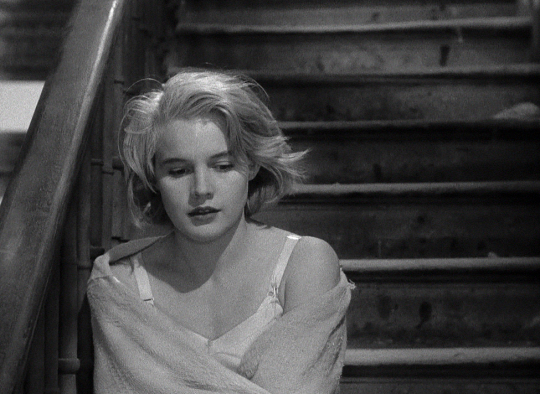“From One White Man to Another”: Sex, Bigotry and Desperation in Elia Kazan’s ‘Baby Doll’ by Judy Berman
By Yasmina Tawil
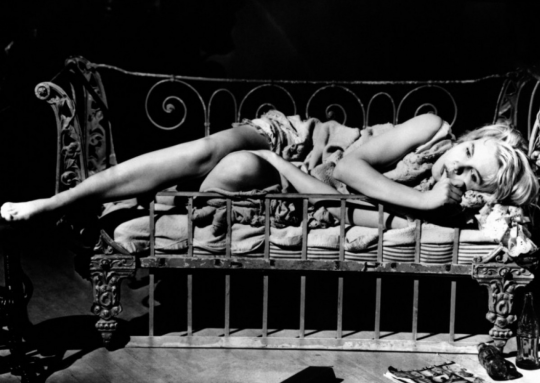
It can be disappointing to read what great filmmakers have to say about their movies. But rarely has a director seemed to misunderstand his own work as completely as Elia Kazan, in a lengthy interview about his sole comedy, Baby Doll (1956), that appears in Jeff Young’s book Kazan: The Master Director Discusses His Films. “It has no meaning,” he claimed. “By the time I got to Baby Doll, I was determined to make a picture with no sympathy and no heroes.”
Kazan appears to be describing a very different film from the one he made. Set in a small Mississippi Delta town just months before Brown v. Board of Education made segregated public schools illegal, and scripted by Tennessee Williams (with lots of uncredited assistance from Kazan), Baby Doll is essentially a Southern Gothic three-hander. Carroll Baker, who also appeared in the George Stevens classic Giant in 1956, plays the title character, a beautiful 19-year-old who’s married to the hapless, middle-aged cotton gin owner Archie Lee Meighan (Karl Malden). Their union is the result of a tragedy and a lie: Baby Doll’s ailing father wanted to ensure her financial security before he died, and Archie Lee led the terminally ill man to believe he could give her a life of luxury. Now, the unhappy couple dwells in a squalid, crumbling mansion. Because Archie Lee promised Baby Doll’s father that he wouldn’t touch her before her 20th birthday, the marriage remains unconsummated—and everyone in town seems to know it.
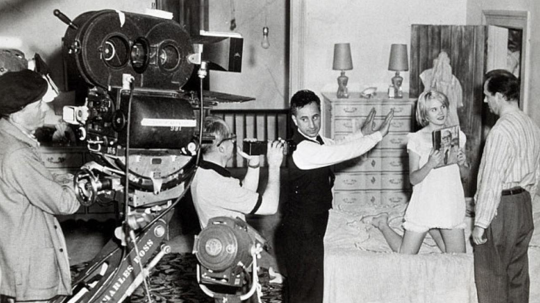
Two days before that date, the furniture the Meighans have purchased on an installment plan gets hauled away for nonpayment and Baby Doll threatens to move out. A desperate Archie Lee burns down a new cotton gin that has stolen all of his business so that his rickety contraption will once again be the only game in town. Their bizarre love triangle is completed when his rival, Silva Vacarro (Eli Wallach, in his first major film role), a Sicilian from Corpus Christi, arrives at the Meighans’ to drop off the cotton he can no longer process. Vacarro has no doubt that Archie Lee set the fire, and when a good ol’ boy cop refuses to investigate an outsider’s “reckless” charges, he decides to handle the matter himself. “I come from a very old country where it’s tradition for every man to make his own justice,” says Vacarro. He’s also shrewd enough to realize that if he wants a confession, he’s best off going through Baby Doll.
Williams’ script, based on his plays 27 Wagons Full of Cotton and The Unsatisfactory Supper, is a master class in character creation. Baker, Wallach and Malden (who’d already won a Best Supporting Actor Oscar for another Kazan collaboration, A Streetcar Named Desire), all Actors Studio alums, fully inhabit their rich roles. Sharp-tongued, imperious and naive, Baby Doll comes off as even younger than her 19 years. Archie Lee, a whiny drunk whose insecurity about his masculinity might stem from impotence, lies and commits arson out of a belief that, despite his lack of any discernible charm or skills, he deserves a thriving business and a gorgeous wife half his age. Although he’s slick and menacing on the surface, Vacarro’s true motives are harder to read.
Each represents a stereotype: the bratty ingénue, the entitled white man, the sneaky and enterprising immigrant. But, contrary to Kazan’s insistence that this black comedy has no overarching meaning or sympathy for its leads, Williams never lets us forget how deeply their roles in society have shaped these characters’ personalities and expectations about each other. For Baby Doll, Vacarro and even, to some extent, Archie Lee, identity is a trap.
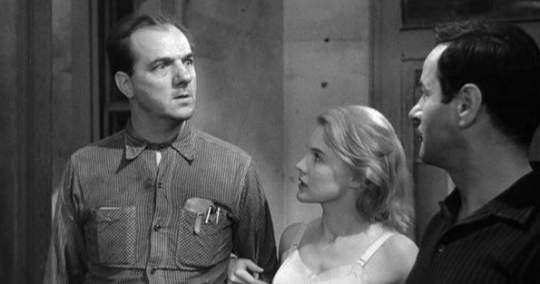
Kazan didn’t see Baby Doll’s central trio as particularly complicated people. He claimed to identify most closely with the film’s nastiest character, Archie Lee, who he described to Young as a classic “middle-aged cuckold”: “pathetic, funny, amusing tragic.” Meanwhile, Vacarro is “as ridiculous as a rooster because you know tomorrow morning somebody’s going to go out there with an axe and cut his head off.” His dismissal of Baby Doll is particularly dispiriting. “I know a lot of girls who are like Baby Doll,” he told Young. “You say to yourself, ‘She’s such a bore.’ Fifteen minutes later you’re going to bed with her. ‘God, she’s a good kid. Oh boy, she’s a cute little animal.’ And you like her. You think, ‘What’s the difference what her ideas are?’”
The director’s appraisal of Archie Lee is solid, if incomplete, although the character doesn’t necessarily begin the film a cuckold. His biggest obstacle is that, as a white landowner, his expectations for his own life exceed his intelligence and abilities. Vacarro has the opposite problem: He’s smart and successful, but lives in a town that doesn’t take kindly to newcomers (or consider Sicilians white), where local police have no interest in protecting his property. What Kazan sees as Vacarro’s foolishness is actually desperation. Sure, he has a lot to lose by challenging Archie Lee. But his other option is to quietly absorb the destruction of his livelihood.
Like Vacarro, Baby Doll is manipulative out of necessity, yet ultimately sympathetic. And she’s never boring. We first glimpse her, a minute or so into the film, asleep in an open crib. She’s clad in a style of nightgown now called a “baby doll dress” in the character’s honor, sucking her thumb. She awakens to the sight of sad, old Archie Lee carving a hole in the wall so that he can watch her. The scene looks tame now, but it’s remarkably explicit for its time, as the introduction to a movie that TIME pronounced “possibly the dirtiest American made motion picture that has ever been exhibited.” In fact, it was barely exhibited following the Catholic League of Decency’s crusade to keep it out of theaters, and is now most famous for the scandal it caused.
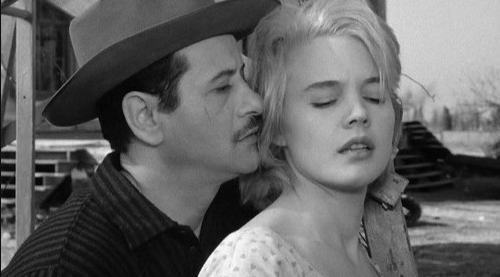
Soon enough, Archie Lee gropes—and maybe even attempts to rape—Baby Doll. We watch him walk into the bathroom where she’s in the tub. Because the Production Code Administration insisted that Kazan cut a shot of Archie Lee touching her while she’s bathing, the camera remains in the hallway as Baby Doll screams, “Get your hands off me!” The scene may have been meant as a lighthearted demonstration of a husband’s sexual frustration, but, six decades later, it reads as a much darker moment. Another early shot finds Baby Doll licking an ice cream cone as local men chuckle and leer at her, while a little girl sitting nearby eats her dessert unmolested. As an adult woman, even her most innocuous, childlike actions are sexualized.
When Vacarro arrives at the Meighans’ estate, such as it is, Baby Doll’s attraction to him is obvious. She looks wide awake, and flustered, for the first time in the film. Ostensibly assuming she won’t be hard to seduce, he takes advantage of her arousal, hoping he can sweet-talk her into incriminating her husband. While Archie Lee attempts to get his broken cotton gin working, Vacarro follows Baby Doll around their yard. Much of their dialogue is hilarious: When he offers her a pecan from a nearby tree, she proclaims, “I wouldn’t dream of eatin’ a nut a man had cracked in his mouth.” Clearly stifling a chuckle, he murmurs, “You’ve got many refinements.”
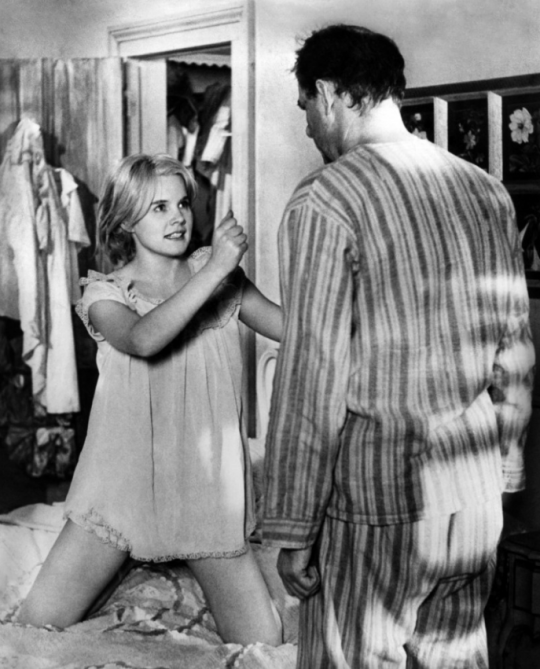
At other moments, though, Vacarro seems to pose a physical threat to Baby Doll. In a rusting car on the Meighans’ lawn, he sits next to her and throws his leg across her body, trapping her inside. “Would you move your leg?” she pleads, more than once, before scrambling out of the vehicle. He crowds in beside her on a swing, puts his arm around her and picks a piece of cotton lint off the front of her shirt. He leans in, and she leans away. When she stands up, she goes weak in the knees. “The scene on the swings in Baby Doll is my exact idea of what eroticism in films should be,” Kazan told Young. But Baker has just as much fear in her eyes as excitement. Eventually, Baby Doll runs away and threatens to call out to a boy in the street. Then she appeals to Archie Lee, who slaps her, in front of his workers, for interrupting him.
The implication isn’t just that Vacarro might seduce Baby Doll, although her weakness and confusion in the face of a man she finds desirable all but prove she’s too inexperienced to be as promiscuous as Archie Lee, Vacarro and various townspeople seem to believe. Even if the Production Code wouldn’t allow Kazan and Williams to spell it out, it’s clear enough that she’s afraid he might rape her—and that stereotypes about swarthy foreigners contributes to that fear. After he sends her husband away on an unnecessary errand, they take turns chasing each other around the house, until Vacarro corners her in the Meighans’ falling-apart basement and forces her to sign an affidavit confirming Archie Lee’s guilt. It’s only after they regress back to childhood together, with Vacarro napping in the crib while she sings to him, that Baby Doll regains her composure. In that moment, he begins to genuinely fall in love with her.
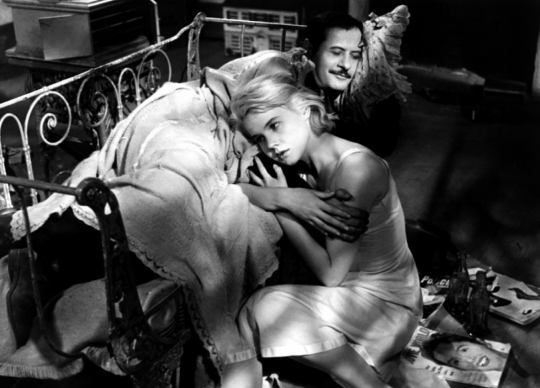
Of course, when Archie Lee gets home, the tension between all three characters explodes. Vacarro taunts him with the prospect that their newly forged partnership will require Baby Doll to “entertain” the Sicilian on a daily basis. When she comes downstairs for dinner, she’s changed into a black dress that makes her look more grown up (and allies her with Vacarro, who also wears black). The new lovers kiss for what appears to be the first time while Archie Lee phones some influential friends who he hopes will help him permanently take out his rival. Their dinner abruptly ends with Archie Lee chasing Vacarro around the yard, shotgun ablaze, as Baby Doll calls the local police on her husband.
While the film never loses its comic tone, its resolution makes a much darker, more serious statement than Kazan acknowledged. As he’s being arrested, Archie Lee appeals to a cop—“from one white man to another”—to make sure Vacarro goes home and leave his wife alone. He obliges and assures the man he’s just caught attempting murder, “We gonna have to go through this thing for appearance’s sake.” It seems inevitable that Archie Lee will be released the next morning and that, when he is, he’ll come looking for Vacarro. Nothing is stopping him from killing the Sicilian; if he succeeds, he’ll get his wife and his business back. His buddies on the squad surely won’t bother to investigate the murder. Although Vacarro is the better man by every measure—as he tells Archie Lee at dinner, “I’m foreign, Meighan, but I’m not revengeful” —he can’t defeat small-town xenophobia.
And then there’s poor Baby Doll, who won’t know where her life is headed until one of these two potential rapists emerges victorious. “We got nothin’ to do but wait till tomorrow and see if we’re remembered or forgotten,” she tells her aunt, who serves as the Meighans’ incompetent live-in cook, in the film’s final line of dialogue. Baby Doll’s beauty, which probably seemed like an asset when her father married her off to a supposedly rich man, can’t liberate her—and she finally realizes that. This is as grim a view of women’s plight as you’ll see in pre-1960s cinema.
It’s Williams’ multilayered script and Baker’s psychologically rich performance, along with Kazan’s singular ability to wring transcendent work out of his actors, that elevate the film beyond its director’s limited ambitions for the story. “You can’t take Baby Doll seriously,” Kazan admonished Young at one point in their interview. But, to his credit, you can.
